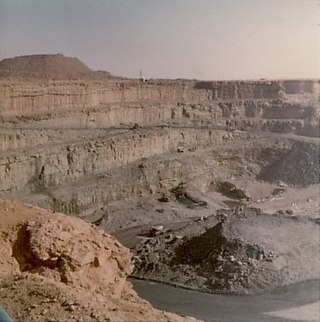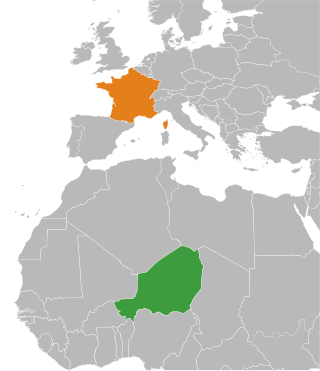Related Research Articles

Agadez, formerly spelled Agadès, is the fifth largest city in Niger, with a population of 110,497 based on the 2012 census. The capital of Agadez Region, it lies in the Sahara desert, and is also the capital of Aïr, one of the traditional Tuareg–Berber federations. The historic centre of the town has been designated a World Heritage Site by UNESCO.

Arlit is an industrial town and capital of the Arlit Department of the Agadez Region of northern-central Niger, built between the Sahara Desert and the eastern edge of the Aïr Mountains. It is 200 kilometers south by road from the border with Algeria. As of 2011, the commune had a total population of 112,432 people.

Azawad, or Azawagh, was a short-lived unrecognised state lasting from 2012 to 2013. Azawagh (Azawaɣ) is the generic Tuareg Berber name for all Tuareg Berber areas, especially the northern half of Mali and northern and western Niger. The Azawadi declaration of independence was declared unilaterally by the National Movement for the Liberation of Azawad (MNLA) in 2012, after a Tuareg rebellion drove the Malian Armed Forces from the region.

From 1990 to 1995, a rebellion by various Tuareg groups took place in Niger and Mali, with the aim of achieving autonomy or forming their own nation-state. The insurgency occurred in a period following the regional famine of the 1980s and subsequent refugee crisis, and a time of generalised political repression and crisis in both nations. The conflict is one in a series of Tuareg-based insurgencies in the colonial and post-colonial history of these nations. In Niger, it is also referred to as the Second or Third Tuareg Rebellion, a reference to the pre-independence rebellions of Ag Mohammed Wau Teguidda Kaocen of the Aïr Mountains in 1914 and the rising of Firhoun of Ikazkazan in 1911, who reappeared in Mali in 1916. In fact the nomadic Tuareg confederations have come into sporadic conflict with the sedentary communities of the region ever since they migrated from the Maghreb into the Sahel region between the 7th and 14th centuries CE. Some Tuareg wanted an independent Tuareg nation to be formed when French colonialism ended. This, combined with dissatisfaction over the new governments, led some Tuareg in Northern Mali to rebel in 1963.
Orano Cycle, formerly COGEMA and Areva NC, is a French nuclear fuel company. It is the main subsidiary of Orano S.A. It is an industrial group active in all stages of the uranium fuel cycle, including uranium mining, conversion, enrichment, spent fuel reprocessing, and recycling.

Mohamed Bazoum is a Nigerien politician who served as the 10th president of Niger from 2021 to 2023. He assumed office in April 2021 after winning the 2020–21 presidential election and surviving a failed coup d'état attempt. He was ousted in the 2023 Nigerien coup d'état by members of the presidential guard and the armed forces led by Abdourahamane Tchiani.

The 2007-2009 Tuareg rebellion was an insurgency that began in February 2007 amongst elements of the Tuareg people living in the Sahara desert regions of northern Mali and Niger. It is one of a series of insurgencies by formerly nomadic Tuareg populations, which had last appeared in the mid-1990s, and date back at least to 1916. Populations dispersed to Algeria and Libya, as well as to the south of Niger and Mali in the 1990s returned only in the late 1990s. Former fighters were to be integrated into national militaries, but the process has been slow and caused increased resentment. Malian Tuaregs had conducted some raids in 2005–2006, which ended in a renewed peace agreement. Fighting in both nations was carried on largely in parallel, but not in concert. While fighting was mostly confined to guerrilla attacks and army counterattacks, large portions of the desert north of each nation were no-go zones for the military and civilians fled to regional capitals like Kidal, Mali and Agadez, Niger. Fighting was largely contained within Mali's Kidal Region and Niger's Agadez Region. Algeria helped negotiate an August 2008 Malian peace deal, which was broken by a rebel faction in December, crushed by the Malian military and wholescale defections of rebels to the government. Niger saw heavy fighting and disruption of uranium production in the mountainous north, before a Libyan backed peace deal, aided by a factional split among the rebels, brought a negotiated ceasefire and amnesty in May 2009.
The Nigerien's Movement for Justice is a largely Tuareg ethnic, northern Niger based militant group. But the MNJ also includes other nomadic ethnicities, within this area, such as the Toubou and the Fulani have also joined the group, which has been battling the Niger government since 2007.
Andéramboukane is a town and cercle in Ménaka Region, Mali. It lies at the extreme east of the country, several kilometers north of the Nigerien border. It was previously a commune in Ménaka Cercle but was promoted to the status of a cercle when Ménaka Region was implemented in 2016.
The May 23, 2006 Democratic Alliance for Change is a Malian Tuareg rebel group, formed in 2006 by ex-combatants from the 1990s Tuareg insurgency in Mali. In 2007, splinters of the organisation returned to combat in northern Mali, launching the Malian element of the 2007 Tuareg insurgency. Led by Ibrahim Ag Bahanga, this ADC faction continued to operate under that name, despite most elements remaining under ceasefire. In July 2008, most of these elements, along with much of the splinter following Ag Bahanga reached another accord with the Malian government in Algiers. Ag Bahanga and a faction of that group rejected the accord and fled to Libya. At the end of 2008, this faction returned to fighting, operating under the name Alliance Touaregue Nord Mali Pour Le Changement (ATNMC). The government of Mali has contended since 2007 that the Ag Bahanga faction of the ADC is a "band of marginals" who were "isolated from the heart of the Tuareg community", primarily motivated by lucrative Trans-Saharan smuggling operations operating from Ag Bahanga's home town of Tin-Zaouatene. Ag Bahanga and the other leaders of his faction contend that the government of Mali oppresses the Tuareg population of the north, and has repeatedly failed to live up to its agreements with the ADC and other groups. Outside observers have also speculated that internal rivalries between Tuareg from the Kel Adagh and the Ouilliminden confederations have frustrated peace attempts.

France–Niger relations are the foreign relations between France and Niger. Their relations are based on a long shared history and the more than sixty year rule of Niger by the French colonial empire, beginning with the French conquest in 1898. Niger obtained independence from France in 1960, and a history of French influenced culture and French language have been a point of commonality in the creation of a distinctive Nigerien culture from the diverse pre-colonial nationalities which make up modern Niger. France benefited economically from their time as a colonial power, and still relies on imports from Niger for elements of their economy.

Ousmane Issoufou Oubandawaki is a Nigerien politician. An engineer by profession, specializing in civil aviation, Oubandawaki held various posts at ASECNA and served in the government of Niger under President Ibrahim Baré Mainassara, first as Minister of National Defense from 1996 to 1997 and then as Minister of Transport from 1997 to 1998. He was Director-General of ASECNA from January 1999 to December 2004.
Rhissa Ag Boula is a Nigerien Tuareg politician and former leader of rebel factions in both the 1990–1995 and the 2007–2009 Tuareg based Insurgencies. He was Nigerien Minister of Tourism from 1996–1999, and again from 1999–2004. His arrest on murder charges in 2004 precipitated armed conflict between his supporters and the Nigerien government. A political leader following the 1995 peace, he again joined a rebel faction from abroad in 2007, creating his own faction from abroad in 2008, and joining the peace process in 2009. In 2010 he was again arrested after returning to Niger.
The Battle of Andéramboukane occurred between 4 and 5 June 2022, during the Ménaka offensive of the Mali War. The pro-government militias Movement for the Salvation of Azawad (MSA) and Imghad Tuareg Self-Defense Group and Allies (GATIA) attempted to retake the Islamic State-held town of Andéramboukane but were unsuccessful.
The Council of Resistance for the Republic is a group founded by former rebel Leader Rhissa Ag Boula which aims to topple the National Council for the Safeguard of the Homeland and restore Mohamed Bazoum as President of Niger following his ousting by the military in the 2023 Nigerien coup d'état in July.
The Ménaka offensive was a series of offensives launched by the Islamic State in the Greater Sahara against the Malian Army, Tuareg self-defense groups including the Movement for the Salvation of Azawad (MSA) and Imghad Tuareg Self-Defense Group and Allies (GATIA), and the al-Qaeda-aligned Jama'at Nasr al-Islam wal Muslimin. The offensives took place in the Ménaka Cercle, in southeastern Mali.
Hassan Ag Fagaga, born around 1959 or 1966, in Kidal, Mali died 22 December 2023, is a former Malian soldier and a Tuareg rebel.

The Coalition of the People of Azawad, also translated as the Coalition for the People of Azawad (CPA) is a Tuareg political and military movement formed in 2014 during the Mali War.
El Hadj Ag Gamou, born December 31, 1964, in Tidermène, Mali, is an Imghad Tuareg Malian division general. Gamou is currently the governor of Kidal Region since November 22, 2023, and has also been the head of his faction of Imghad Tuareg Self-Defense Group and Allies since the group's foundation. Prior to his governorship, Gamou served in the Malian army, commanding Malian troops against Ansar Dine and the National Movement for the Liberation of Azawad (MNLA) in the early stages of the Mali War.
Ibrahim Ag Inawalen, nom de guerreBana, was a Malian soldier and jihadist in Ansar Dine.
References
- 1 2 3 4 5 6 "Niger : Mohamed Akotey, profession négociateur – Jeune Afrique". JeuneAfrique.com (in French). Retrieved 2023-12-05.
- 1 2 "Mohamed Akotey, l'homme dans l'ombre de la libération de Lazarevic". Europe 1 (in French). 2014-12-10. Retrieved 2023-12-05.
- ↑ Guichaoua, Yvan (February 26, 2010). "Circumstantial Alliances and Loose Loyalties in Rebellion Making: The Case of Tuareg Insurgency in Northern Niger (2007-2009)". MICROCON Research. SSRN 1559196 . Retrieved December 5, 2023.
- ↑ "Libération des otages d'Arlit: Mohamed Akotey réfute les propos d'Ahmada Ag Bibi". RFI (in French). 2017-02-04. Retrieved 2023-12-05.